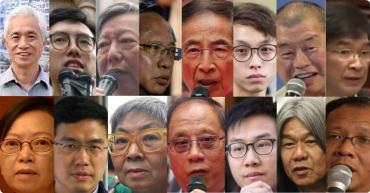The arrests of 15 pro-democracy activists on Saturday, April 18 marked a sharp turning point in the protest movement that has engulfed the city for nearly a full year. Taking place amidst a global pandemic and renewed calls for enactment of Article 23 national security law, this campaign targeted former Legislative Council members, prominent senior barristers, veteran democracy activists, and youth leaders alike—an escalation that indicates ever-dwindling space for the exercise of fundamental human rights and freedoms guaranteed under international and local law in Hong Kong.
The arrested activists included: Martin Lee, 81, founder of the Democratic Party in Hong Kong; Margaret Ng, 72, former politician; Jimmy Lai, 71, founder of a prominent Chinese-language media group that publishes the Apple Daily; and Figo Chan, 23, Co-convenor of the Civil Human Rights Front. All 15 individuals were arrested upon suspicion of organizing or participating in alleged “unauthorized assemblies” in August-October 2019 in protests against the controversial extradition bill proposed by Chief Executive Carrie Lam and her government that year. (Please see the end of this statement for the full list of those arrested.)
All have been released on bail. Their court hearings have been scheduled for May 18, 2020.
“The arrests, following on the heels of a week-long show of force, highlight Beijing’s efforts to test international redlines, relying on the global COVID-19 pandemic to blunt any marshalling of political energy and attention to its alarming and blatant attacks on the rule of law and fundamental rights and freedoms in Hong Kong,” said Sharon Hom, Executive Director of Human Rights in China.
“Because Beijing has failed to win the hearts and minds of the majority of Hong Kong's people, it is now resorting to the only tactics it knows—threats, intimidation, and invoking the language of separatism and national security. As the black hand behind the Hong Kong SAR government, Beijing fuels and condones the misuse and abuse of law against the peaceful exercise of rights.”
This escalation of government action was foreshadowed in statements from the State Council’s Hong Kong and Macau Affairs Office (HKMAO) and the Liaison Office of the Central People’s Government in Hong Kong (LOCPG) just days before the arrests. These statements presented an explicit justification for Beijing’s increasingly direct interference in the affairs of Hong Kong.
The statements included:
The politically motivated arrests this past weekend, which targeted even some of the more moderate voices in the movement, occur at a moment when Beijing—and its entire authoritarian system of government—is under fire for its mishandling of the COVID-19 public health crisis. This action seeks to both attack and undercut the strength and resilience of Hong Kong’s homegrown pro-democracy movement. To further this effort, beyond arresting diverse, representative voices of the movement itself, Beijing and the Hong Kong SAR governments are also renewing calls to enact national security legislation under the purported scope of Article 23 of the Basic Law that will further restrict the space for the legitimate exercise of rights protected by Hong Kong and international law .
On April 15, National Security Education Day, the day that Luo Huining raised the specter of national security risks in Hong Kong, Chief Executive Carrie Lam also released a video address to the Hong Kong people that echoed Luo’s statement on the importance of national security. On one important point, however, she went even further than Luo, stating directly that the protests have brought out “extremist acts approaching terrorism,” thus conflating legally different national security concepts under international law.
The Hong Kong government has attempted to introduce Article 23 security legislation before, nearly 17 years ago. On July 1, 2003, half a million Hong Kong people took to the streets in a mass protest that forced the withdrawal of the bill two months later.
“Hong Kong today faces a more ruthless Beijing, one that no longer feels it needs to hide its hand in undermining rule of law in Hong Kong, and is increasingly brazenly thumbing its nose at the promise it made in an international treaty, the Sino-British Joint Declaration, that it would preserve freedoms in Hong Kong for 50 years after its return to Chinese rule in 1997,” said Hom.
This is an existential crisis moment for the international community. Failure to stand by the Hong Kong people will have consequences for the world. A lawless China acting with impunity, invoking the fig leaf of national security, is a security threat to all nations. International expressions of concern are necessary, but clearly, as history has shown, not enough to elicit a meaningful response from Beijing. As Hong Kong people continue to resist Beijing’s authoritarian encroachment—and make no mistake, they will do precisely that—they are holding the line on internationally protected rights and freedoms for all of us. Now, more than ever, it is time the world made it clear where it stands—and take concrete action.
The upcoming UN Human Rights Committee’s review of the Hong Kong SAR’s implementation of the International Covenant on Civil and Political Rights (ICCPR) is an important opportunity for Hong Kong civil society and other stakeholders to press for the government’s accountability and compliance with its international obligations.
The 15 pro-democracy figures arrested on April 18, 2020 are:

Video address by Luo Huining, Director of Liaison Office in Hong Kong, on “National Security Education Day,” April 15, 2020
Video address by Carrie Lam, Hong Kong Chief Executive, on “National Security Education Day,” April 15, 2020